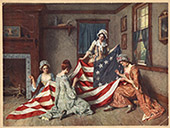Libraries, University of Nebraska-Lincoln
ORCID IDs
Document Type
Archival Material
Date of this Version
1661
Abstract
From 1656 through 1661, the Massachusetts Bay Colony experienced an “invasion” of Quaker missionaries, who were not deterred by the increasingly severe punishments enacted and inflicted by the colonial authorities. In October 1659, two (William Robinson and Marmaduke Stevenson) were hanged at Boston; in June 1660, Mary Dyar (or Dyer) became the third; in March 1661, William Leddra became the fourth (and last) to suffer capital punishment or “martyrdom” for their Quaker beliefs.
While members of the Society of Friends rushed to Massachusetts to test the harsh sentences under the newly enacted laws, other Friends in England simultaneously petitioned Parliament and the newly restored king for relief from this official persecution. When the Massachusetts General Court sent a petition to King Charles II explaining and defending their actions, Edward Burrough, a leading Quaker writer and controversialist, answered it with the publication that follows. Its first part is a point-by-point refutation of the Massachusetts claims; its second part is a detailed list of the punishments, cruelties, and indignities suffered by Friends at the hands of the colonial authorities; its third section is a narrative description of the three executions of 1659 and 1660, including the public statements of the condemned.
Burrough’s publication (and a subsequent audience with the king) led to Charles’ issuance of an order halting the punishments in the fall of 1661, although they were resumed, in only slightly less severe form, the following year.
The complete text of the 32-page work is presented here, along with pertinent notes and some relevant additional documents.


